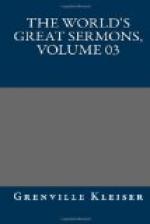During a long course of ages, Providence seemed to be occupied in preparing the world for this revolution. The whole Jewish economy was intended to usher it in. The knowledge of God was preserved unextinguished in one corner of the world, that thence, in due time, might issue forth the light which was to overspread the earth. Successive revelations gradually enlarged the views of men beyond the narrow bounds of Judea, to a more extensive kingdom of God. Signs and miracles awakened their expectation and directed their eyes toward this great event. Whether God descended on the flaming mountain, or spoke by the prophet’s voice; whether He scattered His chosen people into captivity, or reassembled them in their own land, He was still carrying on a progressive plan, which was accomplished at the death of Christ.
Not only in the territories of Israel, but over all the earth, the great dispensations of Providence respected the approach of this important hour. If empires rose or fell; if war divided, or peace united, the nations; if learning civilized their manners, or philosophy enlarged their views; all was, by the secret decree of Heaven, made to ripen the world for that “fulness of time,” when Christ was to publish the whole counsel of God. The Persian, the Macedonian, the Roman conqueror, entered upon the stage each at his predicted period. The revolutions of power, and the succession of monarchies, were so arranged by Providence, as to facilitate the progress of the gospel through the habitable world, after the day had arrived, “when the stone which was cut out of the mountain without hands, should become a great mountain and fill the earth.” This was the day which Abraham saw afar off, and was glad. This was the day which “many prophets, and kings, and righteous men desired to see, but could not”; the day for which “the earnest expectation of the creature,” long opprest with ignorance, and bewildered in superstition, might be justly said to wait.
V. This was the hour of Christ’s triumph over all the powers of darkness; the hour in which He overthrew dominions and thrones, “led captivity captive, and gave gifts unto men.” The contest which the kingdom of darkness had long maintained against the kingdom of light was now brought to its crisis. The period was come when “the seed of the woman shall bruise the head of the serpent” For many ages the most gross superstition had filled the earth. “The glory of the incorruptible God” was everywhere, except in the land of Judea, “changed into images made like to corruptible man, and to birds, and beasts, and creeping-things.” The world, which the Almighty created for Himself, seemed to have become a temple of idols. Even to vices and passions altars were raised; and what was entitled religion, was in effect a discipline of impurity. In the midst of this universal darkness, Satan had erected his throne, and the learned and the polished, as well as the savage nations, bowed down before him.




